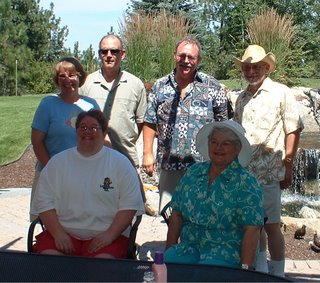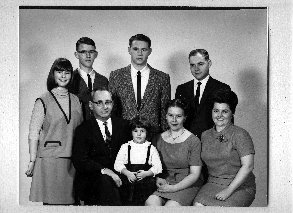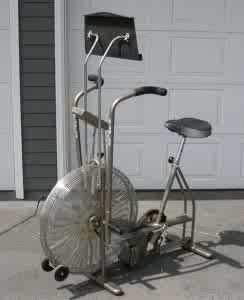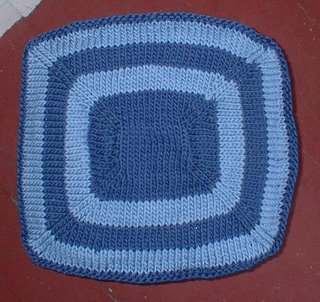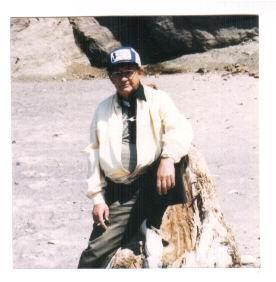I didn't get a chance to put in my tribute to my Dad for Father's Day as I was on my way to Hawaii. So here's to my Dad.
William Earle Sharp was born on September 1st, 1913, in a house in the Red Deer River valley of Alberta Canada. The town was Steveville, one of the many tiny places scattered amongst wheat fields and pioneer farms. The house he grew up in was a single construction one room shack with newspaper for wallpaper and no larger than your average living room. The only heat came from an iron stove and during the winter it was not uncommon for him to wake up with frost on his blankets from his breath. The tips of his fingers were permanently shortened from the cold.
His mother, Mary "Molly" Carr, came from a line of farmers that had come from rural New York to Alberta to make a living off the rich land. From what I have been told, Molly had a weak spot for men, falling in love then having her heart broken. She married Richard Sharp, an emigre from England, but after Dad was born he left her. Molly was able to have her marriage annulled and five years after Dad's birth married Frank Stephens. Earle never spoke of his natural father and it was understood that one didn't ask him about Richard. Up to his death Dad always felt that it was a man's duty to provide for his family and held those who didn't with great contempt.
Earle talked about his memories of growing up on the prairie but it was a hard life. When he was nine, Molly and Frank decided to immigrate to the US and went to Spokane. At that time, Earle changed his name from William Earle Sharp to Earle William Stephens, taking on his stepfather's surname. They ended up settling in Portland. Frank had a difficult time finding work, so Dad took a job selling newspapers to help pay the bills. During the depression, it was Earle who brought in the money from his newspaper sales, selling eggs from their chickens, and whatever work he could find. He never forgot those days of scrabbling for a living, giving up going to school so that his parents and he could have food on the table. Night school helped him earn a high school diploma, but it was said that he had at most five or six years of formal education. The rest was learned on the streets.
Earle married his first wife Marian in the midst of the Depression and together they had two children, Pam and Larry. Earle continued his work in the newspaper business, taking on a job of selling advertising space for the Oregon Journal. But their marriage did not last and Earle divorced Marian. World War II broke out and being a single dad with two children made Earle exempt from serving. He continued working to support his kids but also went out with his friends to the Press Club to socialize. During one of those gatherings, he met Virginia Brown and fell in love.
Ginny was reticent at first, but Earle was persistent, wooing her with letters, flowers, and nights on the town. Eventually she accepted his proposal of marriage, but there was a stipulation: he had to change his political party. He was a New Deal Democrat and Ginny's family were staunch Republicans. It was a compromise he was willing to make. It almost came to an end on their wedding day when during the reception his mother-in-law caught Earle and his buddies playing craps in the cellar. It was bad enough that they were caught gambling; it would have been worse if Earle's mother-in-law (a member of the Women's Christian Temperance Union) had found the pint of whisky in the rafters. But Earle proved to be a devoted son-in-law.
With Earle remarried, there was the question of the children. They were now staying with their mother, but Earle was anxious to have them with him and his new wife. Eventually he won custody of Pam and Larry and they moved into the household just as Ginny was having her third child. Pam wasn't there long, but the house on Pacific street was too small for the family, so Earle and Ginny went househunting. A large house was found in the Irvington neighborhood and soon the family were all settled in.
A newspaper strike forced Earle to look for work elsewhere, first taking a job in construction. A friend gave him a tip on a job at a new television station and soon Earle was on the street selling advertising time for KOIN. He was fiercely loyal to them, going so far as buying a color TV when they first came out so that he could check to see that the ads he had negotiated were appearing when they should. He was known to the people at KOIN as Earle the Pearl for his sunny, optimistic outlook and jovial personality, and his hard work eventually won him the position of sales manager.
When Earle wasn't working, he was active in the Lion's Club and the Salvation Army. The Lion's Club gave him the networking outlet he wanted combined with providing good works for the poor. The Salvation Army became a part of his life when he was younger and scrabbling for a living on the streets and in return for keeping him on a moral path he gave of himself to them in hard work on projects. Every Christmas he cajoled his fellow Lions to go ring bells for the Salvation Army buckets. He took his children to the Salvation Army Children's Christmas Party to show them what their work did for easing poverty. He never forgot his past and how hard a life that was. It was important that his children understood and appreciated what it meant for them to be living well and to give to those who went without.
Unfortunately, one of the things about television is that stations change hands and with the changing of ownership comes changes of personnel. Dad was removed from the sales manager position and returned to selling advertising time, a blow to his pride that drove him to alcohol to find solace. By then most of his children had left home and one, a daughter, remained. Ginny tried to stop his drinking, but Earle had the genetic propensity towards alcoholism and he fell victim to its effects. He retired from KOIN but found himself bored and took on a job as a night security man at Portland Bottling. The long hours of standing on concrete and drinking at home took its toll on his body and he had to quit. By then, he was diagnosed with Alzheimer's disease, and ten years after he retired he died in his sleep of a stroke.
I didn't know my dad well, for by the time I was old enough to start knowing him he was succumbing to alcohol. I remember a few times when we did things together: going to see the Portland Beavers play the Pittsburgh Pirates at Civic Stadium; a father-daughter dinner with the Lions Club; going fishing for trout. But I did not love my dad liked I loved my mom. We were two different personalities and mine was more like my mom's. My most persistent memories were of taking care of him when he was ill and later taking my mom to go see him in adult foster care. I would see the recognition in his eyes but he could not say my name. He was an intelligent, caring man, but it was on his terms. My brothers, especially Larry, tell me of the pressure they had been under from Dad to succeed in their lives.
But if you had a crying child, you could put the child in Dad's arms and the child would quiet. He loved children and reveled at the sight of his grandchildren. He was proud that he rose from being dirt poor to owning his own home and raising a successful family. It's that man that I honor and thank for giving me the gifts of optimism, persistence, and generosity to others in need.
Just for the record, I'm aware of the Salvation Army's stand on homosexuality. It's a source of conflict for me, because I have seen the positive effects of their work for the poor.

